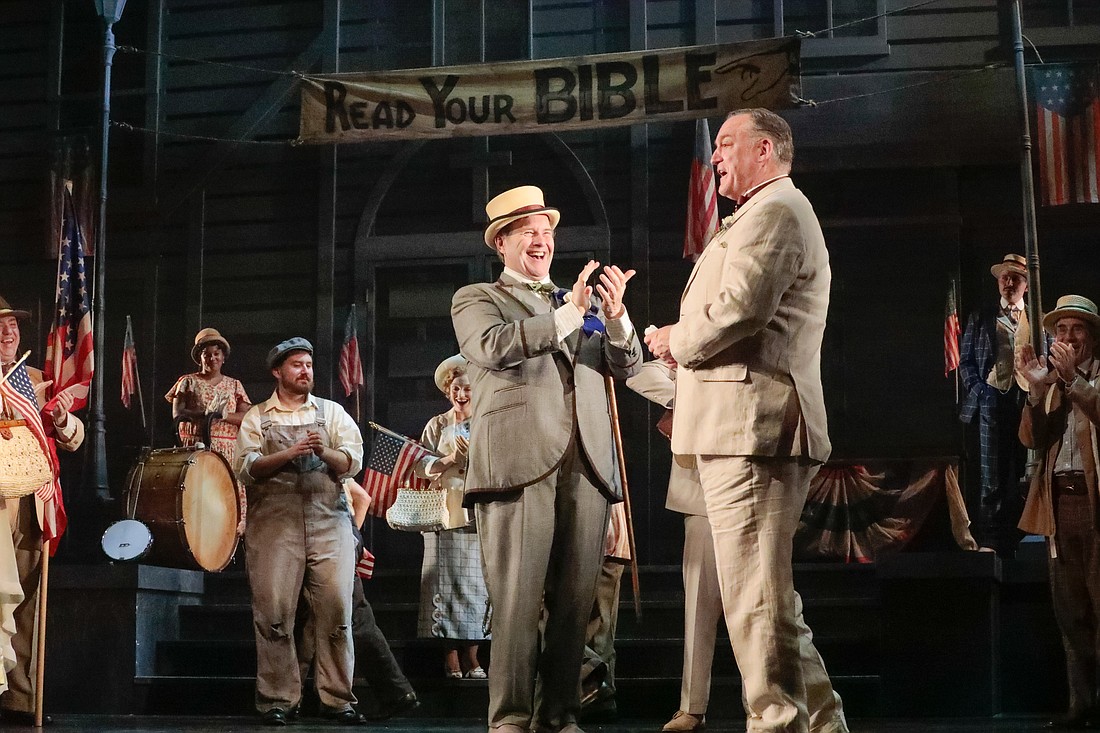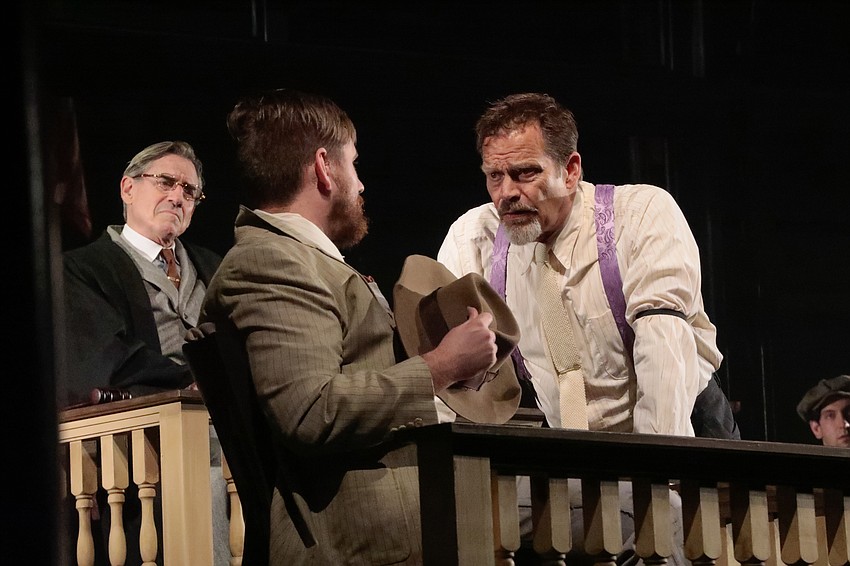- May 7, 2025
-
-
Loading

Loading

“Inherit the Wind” has thundered onto the Asolo Repertory stage. Jerome Lawrence and Robert E. Lee’s 1955 play depicts an early 20th-century battle in America’s culture wars. Sadly, it’s as timely as ever. Here’s the historical fact behind the fiction.
Back in the 1920s, the State of Tennessee passed a law against teaching evolution in its public schools. A high school science teacher named John Scopes broke that law. He was put on trial in 1925.
Clarence Darrow argued for the defense; William Jennings Bryan argued for the prosecution; H.L, Mencken covered the proceedings for The Baltimore Sun and christened the courtroom showdown “The Monkey Trial.” His sneering nickname stuck.
Lawrence and Lee’s play is a fictionalized version of that trial. Its characters are thinly disguised versions of their real-world counterparts. (Matthew Harrison Brady = Bryan; E.K. Hornbeck = Mencken; Darrow = Henry Drummond.) The play’s core message wears no disguise: Freedom of thought is worth fighting for.
“Inherit the Wind” is a fight all right. It’s a courtroom drama — and the main event is the oratorical slugfest between Drummond (Mark Benninghofen) and Brady (Andrew Long) in the trial itself. The two lawyers don’t fight fair. Brady kicks the legs out from under Drummond by denying him the use of scientific testimony.
Drummond puts Brady on the stand as a “Biblical expert” and makes him look like a ludicrous living fossil. The jury ultimately finds the science teacher guilty, but it’s a hollow victory for fundamentalism. As in real life, his $100 fine is merely symbolic. The drama unfolds in an early 20th-century media circus. Thanks to the emerging technology of radio, Brady and his Bible-belt cohorts look like losers to listeners nationwide.

“Inherit the Wind” is not a neutral referee in this bout. Lee and Lawrence’s script definitely takes the side of science. While it doesn’t demonize the opposing side, it doesn’t paint a pretty picture of the faithful. Some productions of this play portray this small-town “spiritual community” as dangerous fanatics. Director Peter Rothstein takes a more evenhanded approach — he’s sympathetic to characters on both sides.
On top of that, Rothstein adds a musical accompaniment to the war of ideas. Along with “That Old Time Religion,” he’s expanded the play’s hymnal to include “Higher Ground,” “Freedom Road” and many others. These songs sweeten your perception of the singers. That also softens the blow. That said, the actors are all in fighting trim.
Benninghofen’s Drummond is a rumpled cousin of Peter Falk’s Colombo character. He’s oddly indifferent to his personal appearance — and his slovenly look puts people off guard. On the inside, the man’s a quick-thinking chess master of legal strategy. So what if the small-minded townsfolk think he’s the devil? Who cares? Drummond can out-think anyone in the courtroom —and he knows it.
In contrast, Long’s Brady is obsessed with his image. He’s a three-time Presidential candidate who never made it to the White House. He’s also a barn-burning speaker and sermonizer — and a surefire hit on the Chautauqua circuit. The townsfolk love him — and think he’s doing the Lord’s work. Brady’s on a mission from God — how could he possibly fail? (Overconfidence, possibly.)
Mikhail Roberts’ Cates, the schoolteacher character, is a reluctant hero. He wanted to teach a science lesson, not become America’s evolutionary apostle. Despite Cates’ second thoughts, he doesn’t recant.
While she admires his courage, his girlfriend, Rachel (Brielle Rivera Headrington), would rather he did. For her, the blistering hate directed at Cates hits close to home.
Rev. Brown (Curtis Bannister) is Rachel’s father — and one of the town’s chief haters. Bannister aptly captures the rhythms of hellfire sermonizing. His character evidently missed that whole “Judge not” passage – and starts metaphorically whipping the teacher with the Bible belt. Rev. Brown publicly prays for Cates’ eternal damnation — and asks God to cast his daughter into hellfire, too, when she won’t say “amen.”
Sasha Andreev’s Hornbeck is a hoot as the cynical outsider who reports on the rubes with sneers and smears. (For the record, Hornbeck’s a distorted caricature of Mencken. His actual “Monkey Trial” dispatches are online, if you’re curious.) But Andreev brings the character to life with wisecracking verve.
David Breitbarth plays the presiding judge at the “Monkey Trial.” He exudes gravitas — and seems to have second thoughts about the fundamentalist whirlwind swirling around him.
These strong performances unfold in Kate Sutton Johnson’s imaginative three-stage set, which morphs into a courtroom, hotel or public square as needed. Fabian Aguilar's costumes are a sepia snapshot of 1925. (As the play unfolds in a heat wave, they’re all sweaty — which must have made his job tougher.)
Matthew Parker’s sound design and Philip Rosenberg’s lighting are more dreamy than realistic. This is a memory of the old days. In reality, these were the bad old days for many. But artful imagination softens the sharp edges.
It all adds up to a great show. This production is entertaining from start to finish. But I’m not sure if the medium distorts the play’s message.
While “Inherit the Wind” isn’t a musical, with Rothstein’s directorial approach, it might as well be. The old hymns he’s added evoke a sense of what America’s small towns were like in the early 20th century.
Fellowship, love and togetherness. Hearing these songs, that’s what you feel. And then you realize something: That warm sense of belonging? That’s what these folks were afraid of losing. That’s why they were afraid of evolution theory. You start to see the small town’s point of view.
Lawrence and Lee had a very different point of view. “Inherit the Wind” was a backhanded slap at McCarthyism. The playwrights tried to be fair. But the picture they painted of populist crusades that demonized the latest flavor of thought crime was meant to be terrifying. They weren’t nostalgic about the small minds of small town America.
The playwrights didn’t want you to see their point of view.
They wanted you to see the threat those small minds posed.
Correction: The article has been updated to correct names of the creative team.